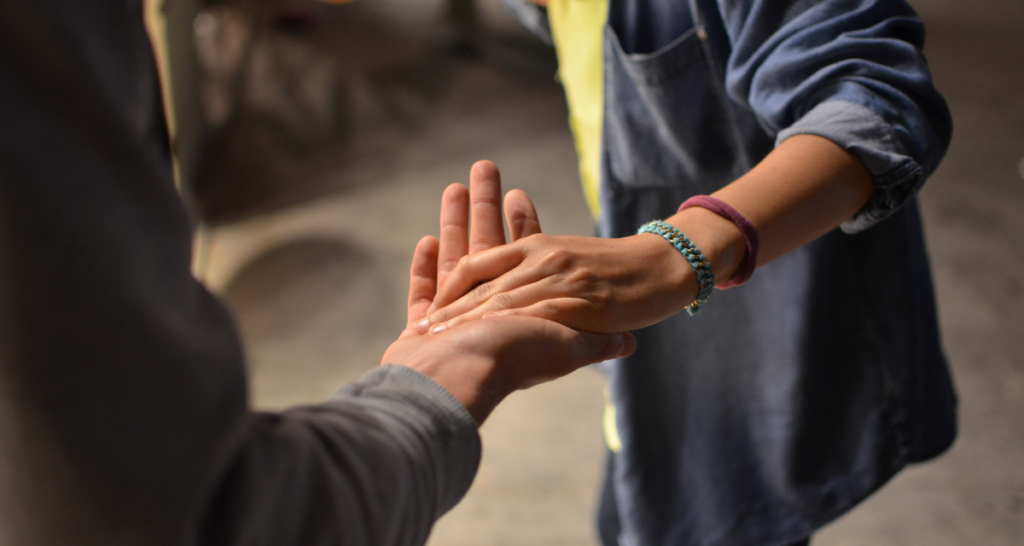Alexis M. (she/her) is a former Looking Glass participant in two of our free and accessible Peer Support Programs: Personal Recovery Space and Online Peer Support Chats, as well as a recipient of our 2023 Reflections Scholarship.
We had the honour of sitting down with Alexis to speak with her firsthand about her journey to recovery, hope for the future, and the role that Looking Glass Foundation played in each. This Winter season, your donation is vital in sustaining and expanding our services to ensure that we can support more individuals like Alexis.

[Looking Glass Foundation] Welcome, Alexis, and thank you for taking the time to chat with us! Why don’t we start out with you telling us a bit about yourself?
[Alexis M.] Thank you! I’m so glad to be here and to be able to share my story.
Throughout my life, I have been many things: a professional equestrian, an avid outdoorswoman, a runner, a competitive cyclist, and most recently, I have discovered a passion and solace in farming, where I help run 35 acres of Hereford cattle and other livestock in Yellow Point on Vancouver Island.
Along with all these accomplishments, it is vital to note that I have also spent over half of my life with a life-altering mental illness, struggling with anorexia nervous since the age of 14. I am now 35 years old.
Growing up adopted and not looking like the rest of my family left me with a missing piece of my puzzle – I never felt quite comfortable, though I did not know why. I now know it’s related to early-developmental trauma, from being separated from my biological mother, and having a highly sensitive empathic nature. Nevertheless, over the years, the discomfort manifested into an eating disorder and in 2015 I was hospitalized, beginning the most difficult three years of my experience with anorexia.
[LGF] How has Looking Glass impacted your personal recovery journey?
[Alexis] Along the way I have accessed many resources, the most effective of which has been the Looking Glass Peer Support Programs. I was a participant in both the Personal Recovery Space and weekly Online Peer Support Chats. I have also been blessed with an excellent therapist, which has been integral in helping me address the underlying issues that trigger anorexia.
This past September, with the support of the Looking Glass Reflections Scholarship, I have proudly returned to my educational journey and began the Bachelor of Science in Nursing program at Vancouver Island University, with a goal to work in geriatric or palliative care. Receiving the Reflections Scholarship certainly provided crucial financial relief, but far beyond that was the validation of an organization I have so much respect and pride for. Knowing that Looking Glass sees me, hears me, and has my back – there is no monetary value that can be placed on that feeling.
[LGF] What does recovery mean to you?
[Alexis] My experience of seeking recovery has been a decades-long process that has been anything but linear. I have a different take on the term “recovery”, and as an act of self-care, I prefer to use the word “remission”. It allows me the space to provide myself with self-compassion when thoughts that align with anorexia arise. I know that as time goes on, I am constantly picking up new skills and techniques to ensure that healthy thoughts of living free of an eating disorder matter more and are heard louder, but I think if I assume I’ve reached “health” the insipid voices and lies could somehow slide in amongst healthy thoughts and get a foothold.
My healing journey from anorexia has allowed me to develop a sense of self-efficacy and safety through feeling. It has provided me resilience through navigating my emotions, not simply masking those feelings altogether. I no longer get “stuck” in emotions because I get to feel all of them – they don’t always feel great, but I get to feel them. Through feeling, we can process and, ultimately, move forwards.
[LGF] What keeps you motivated?
[Alexis] The farm has been a game-changer. When I was released from the hospital into my parent’s custody on the farm, I was still having a difficult time improving my day-to-day quality of life. In fact, my weight slipped lower than ever and the suicidal thoughts that had led the psychiatrist to commit me to hospital in the first place were heightened. The lifestyle of the farm – the power of animals along with the connectivity and community felt – has been integral in my healing.
As someone who grew up with a family that I could not see myself in, I found profound comfort in meeting my biological grandfather in 2019. I saw him and thought this is me. It just made sense, for the first time in my life I looked at a member of my family and saw myself in them. Meeting him and discovering our likeness went far beyond skin tone – I saw parts of myself in him, including mannerisms and our shared faith that offered me a newfound sense of wholeness.
[LGF] What would you share with someone who is just embarking on their ED recovery journey?
[Alexis] You are not alone. You don’t have to tell everyone, but if you can find one person to tell – if one person can be there for you – that is huge. For me, it took quite a while to find that one person. That is where the Looking Glass Peer Support Programs are massively important. Eating disorders thrive in secrecy – it is hard to reach out but ripping that bandage off is the best thing I have ever done.
[LGF]What do you think people outside of the ED community should know about eating disorders?
[Alexis] You can’t judge people’s relationship with food and health based on how they look – you have no idea what someone is doing with (or without) food just based on appearance. Appearance is not an accurate judgement of how well or unwell an individual is, yet we are constantly making assumptions about how someone is based entirely on how they look.
At the height of my battle with anorexia and my own personal rock bottom, when I was admitted to hospital in 2015, I was still considered “healthy” according to the BMI chart. Someone who is naturally athletic will likely not be appropriately assessed with this tool but, really, nobody should be compared to a mere number. After hospital, I actively sought to be in the “underweight” BMI category. I managed it and, in doing so, seriously jeopardized my life; all for clinical recognition that I was not okay. Health is so much more than a number, as are each of us as individuals.

Alexis’ story serves as a testament to the impact of Looking Glass Foundation’s Peer Support Programs to help individuals feel supported and empowered on their healing journey.
These accessible programs are available to Canadian residents of all genders and are offered at no cost. No formal eating disorder diagnosis or referral is required.
Explore our three safe, inclusive, non-judgmental Peer Support Programs here.

